Only 40% of companies feel prepared to comply with ESG regulations
LeanIX IT Sustainability & ESG Survey shows: Despite the growing importance of ESG initiatives, efforts around IT sustainability fall short
Bonn/Boston, March 12, 2023. Ninety percent of companies surveyed are currently pursuing sustainability and other ESG initiatives, and the relevance of such initiatives increased from 2022 to 2023. However, only 55 percent report initiatives focused on IT sustainability, with the primary focus there being the sustainability of the application portfolio. What’s more, only 40 percent consider their company well prepared to comply with existing and emerging ESG regulations. This lack of preparedness may result of the absence of clear, organizational focus. The recent LeanIX IT Sustainability & ESG Survey found that the majority of companies (two-thirds) have three or more departments involved in ESG initiatives. In addition to collaboration, these initiatives need reliable data to succeed. Unfortunately, in 40 percent of companies, enterprise architects, who possess detailed knowledge on the IT landscape, are not involved in these initiatives at all and more than half say their involvement is too low.
Download a free copy of the study report
Gartner analysts consider sustainability one of the most important strategic technology trends in 2024 and predict that by 2027, a quarter of CIOs will see their compensation linked to this topic. So, how are companies around the world approaching IT sustainability and ESG initiatives?
To answer that question, LeanIX, an SAP company, surveyed 177 IT experts from its global customer portfolio during the latter half of 2023. 73 percent of those surveyed work for companies based in Europe, another 18 percent work for US companies. Respondents represent a range of different industries and an even distribution of company sizes, with 40 percent working in organizations with over 10,000 employees. Enterprise architects make up the largest share of the sample at 78 percent.
Nearly all companies report current ESG initiatives
90 percent of respondents report currently pursuing ESG measures, with environmental issues being the top priority in three quarters of cases. While half of the companies surveyed view such initiatives as relevant (38 percent say “Highly relevant”), 30 percent assign them low or zero relevance.
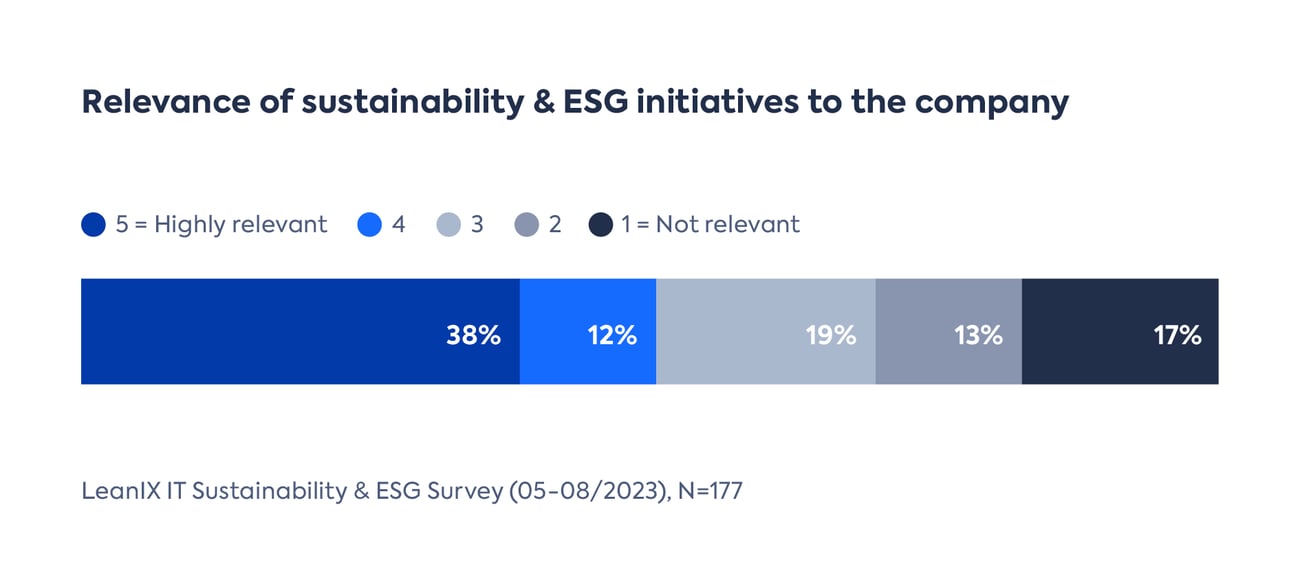
That being said, the relevance of such topics continues to increase. 80 percent report that sustainability and ESG initiatives became more or much more important from 2022 to 2023.
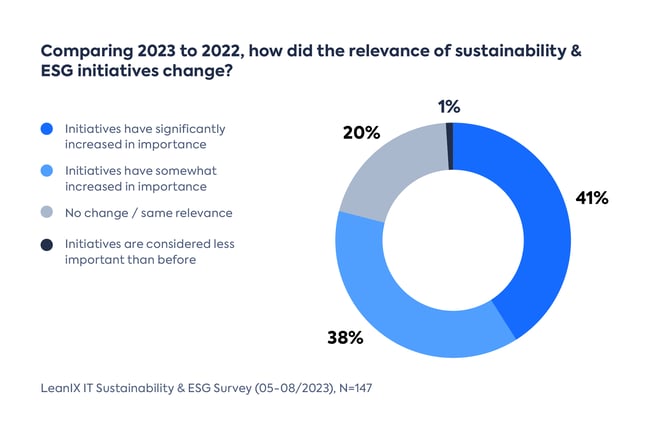
Only 55 percent of companies report IT sustainability initiatives
Although some focus on ESG issues seems nearly universal, only 55 percent of companies report concrete IT sustainability initiatives. Of those companies, two thirds reported still being in the planning phase of these activities at the time of the survey and had not yet implemented them. The three IT sustainability initiatives mentioned with equal frequency were:
- Collecting data and analyzing the IT infrastructure’s carbon footprint
- Reducing the IT infrastructure‘s carbon footprint
- Assessing vendors based on their commitment to sustainability
Whether or not the company reported a focus on IT sustainability, we asked about the relevance for sustainability when managing the application portfolio. A very similar picture emerged: 51 percent reported taking sustainability into consideration with regards to the application portfolio.
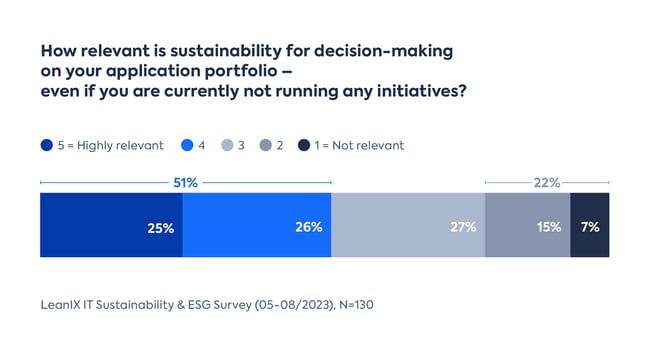
It may be the case that IT sustainability is not at the top of the agenda for many companies because IT only accounts for a small proportion of the organization's carbon footprint (think of companies where carbon emissions are traditionally very high). However, it must be noted that IT broadly accounts for three percent of global CO2 emissions, according to a 2022 study by Capgemini. That is more than Spain, Italy, France and Portugal produce together. Against this backdrop, it seems that companies would be justified in paying closer attention to their IT operations.
Overall, companies do not consider themselves prepared to comply with ESG regulations
90 percent of companies are pursuing ESG initiatives. However, this impressive number becomes less impressive when you consider that fewer than half of those surveyed believe their company is fully prepared to meet legal ESG requirements.
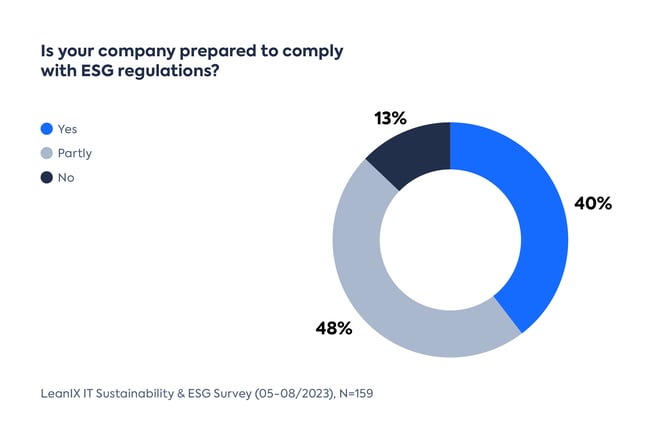
So, are companies implementing the wrong ESG initiatives? Or do they simply lack clear targets and effective collaboration?
The present study shows that many different departments are involved in ESG initiatives – in two thirds of organizations three or more teams handle these initiatives. If companies perceive themselves to be unprepared on the regulatory front, it could be due to challenges around collaboration, coordination, and communication between the various responsible parties.
The study also found that in half of the companies surveyed, the CEO organization is responsible for ESG measures. This could mean that these companies treat such initiatives more as higher-level strategic projects and less as operational goals. This would explain why respondents do not see these efforts resulting in regulatory preparedness.
If you look at how companies track IT sustainability initiatives, you see that – as is so often the case in business – Excel is the go-to tool for 62 percent of those surveyed. Naturally, there are more useful tools for collaborative work based on a shared, reliable source of data.
Only a few companies rely on the expertise of enterprise architects for ESG initiatives
As stewards of the IT landscape, enterprise architects have access to modern EA tools capable of maintaining a data-rich technology inventory and tracking the ecological impact of the application portfolio. Such a centralized data source can prove invaluable for cross-departmental collaboration. Improved collaboration would be a game changer, especially for the large number of teams involved in ESG initiatives described above. In addition, enterprise architects can apply their expertise to the planning and management of transformation projects focused on supporting business capabilities critical to successful ESG efforts.
In other words, enterprise architects can play a crucial role in overcoming the challenges that stand in the way of ESG initiatives. As it turns out, the LeanIX IT Sustainability & ESG Survey shows that in 40 percent of organizations surveyed, enterprise architects are seldom or not at all involved in ESG activities. Indeed, 54 percent of those surveyed consider the overall involvement of enterprise architects in these initiatives too low.
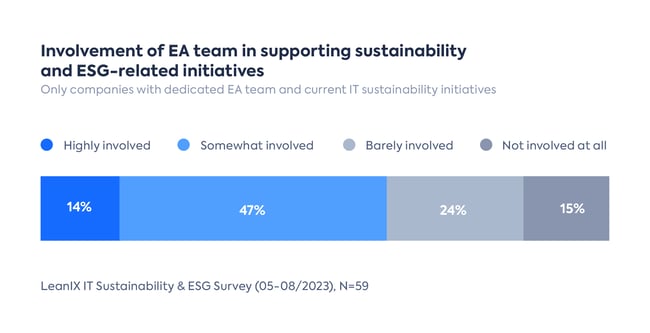
Conclusion: Achieving ESG goals with concrete data
Nearly all companies today have implemented ESG programs. Nevertheless, most do not feel adequately prepared to comply with ESG regulations and efforts focused on IT sustainability are especially wanting. Given the dependence of all companies today on IT, this is a missed opportunity. Enterprise architects can help drive IT sustainabilyt and other ESG efforts forward by providing reliable insight into the current carbon footprint of IT, as well as by designing an enterprise architecture that delivers on ESG goals and modernizing applications with this goal in mind.
Annotation:
For better readability, the results in this report are presented as percentages without decimal places. If the addition of these values does not result in exactly 100%, then this can be attributed to rounding differences.
Free downloads: